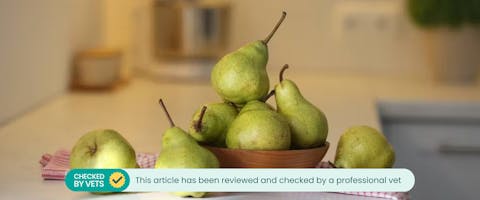Updated 12/05/2023
It’s no secret that pears are packed full of nutrients for us humans - bursting with fiber, vitamins and plant compounds, they’re thought to reduce inflammation and promote heart and even gut health. But can cats eat pears, or are pears poisonous to cats? Let’s take a look…
Trending posts
Purr-use some of the top blogs our members have been loving this month- Top male dog names for your new furry friendGot a new furry family member in your pack? Check…

- Top female dog names for your new fluffy palWelcoming a new pooch into your family? Explore…

- 120+ gray cat names your silver feline will loveRecently welcomed a fluffy gray bundle of joy into…

- What are normal pet sitting rates?Discover the average pet sitting rates for animals…

- Unique dog names to stand out from the packDare to be different with our list of the best…

Can cats eat pears?
So are pears safe for cats? The short answer is yes, cats can eat pears. They’re packed with vitamin C, A and fiber, so they’re a great way for your kitty to get some extra goodness in, alongside a balanced, cat-safe diet. Like with all fruits and vegetables though, it’s important to keep it minimal. Cats are carnivores, afterall, so should be fed a meat-based diet of commercially-available cat food. And note, only the flesh is safe for cats. Pear seeds, the stem and skin contain small amounts of cyanide which is poisonous to cats, as cyanide inhibits cells in your cat’s body from taking in sufficient amounts of oxygen. Be sure to remove all traces of these before treating your kitty.
Can cats eat Korean pears?
Like other types of pears, Korean pears are safe for cats in small amounts, as a treat every now and then. And be sure to remove the seeds, skin and stem as they’re also poisonous to our feline friends due to the cyanide content. Like with any new addition to your cat’s diet though, chat to your vet before introducing anything. They’ll be able to best advise you on what’s safe for your kitty pal’s age, weight and breed.
Feeding your cat pears
While a colorful diet of different fruits and vegetables is super important for a healthy human, it simply isn’t the same in the feline world. They’re carnivores, so the best diet for a cat is a meat-based one, made up of commercially-available cat food that’s been specifically designed for their age and breed. So, when considering whether to feed your kitty certain fruits and vegetables, firstly check if they’re cat-safe. Second, consider whether it’s necessary at all (which it really isn’t). But we know as well as anyone that it feels great to treat our favorite fluffy friends. So, if you’d like to feed your cat pears, stick to small amounts, steer clear of the skin, stem and seeds, and don’t do it very often.
Meet our veterinary expert, Emma
This article has been checked by veterinarian Emma Chandley, BVetMed MRCVS PGCertSAS. Emma graduated from the Royal Vet College in London in 2011. She has a keen interest in surgery and went on to do a postgraduate certificate in small animal surgery and was then awarded advanced practitioner status in the same discipline.
Other foods that are safe for cats
Your carnivorous kitty should, as the same suggests, be eating a diet mainly made up of meat. But, if you’d like to give your furry family member a treat on special occasions, we get it. Before doing so though, be sure to check which foods are safe for cats, and which aren’t. To get you started, here are a few that your kitty is safe to eat.
- Cooked oily fish (as a treat, in moderation)
- Pumpkin
- Other vegetables
- Oatmeal
- Cooked meat and eggs
- Corn
- Brown rice
- Broccoli
- Apples (if deseeded)

